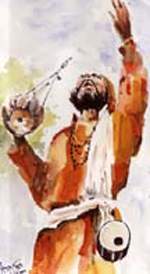
Baul Religion
The most distinctive quality of Baul religious is it's robust simplicity and directness of expression. The Baul accepts that God is formless, but to him form and formless are one and inseparable, what matters most to the Baul is the interrelationship between God and existence, the Universe.
In his attitude to God and the Universe, the Baul is closer to the religious thought of the TANTRA'S than that of the VEDAS. The Vedas were brought by the Aryans, and in general deal with the God's related to nature, such of those of the sun and the rains , and place value on masculinity as personified by tough animal-breeders. The tantras, on the other hand, reflect the ancient folklore of the land of pre-Aryans times, though much it has been discreetly aryanized. It deals with the domain of the mind, the known and unknown spheres of human psychology, and masculine power and female energy both in sex and in the search for God. In the TANTRAS the worlds of God, demon, and man, the abstract and the tangible, are the reflections of the same vital source .
There is, however, one respect in which the Baul and the TANTRAS differ in their attitude to love. The approach of the TANTRAS is earthy and harsh. They take the impulses and passions into account only in order to be free of them. They have little patience for the emotional sublimation of the impulses, such as love, which does not strike the TANTRAS mind as reliable, whereas to the Baul, love is nearly a synonym for God.
Owing to his lack of conventional leanings, the Baul is able to surpass most others in directness of expression.
This emphasis on love in Baul literature suggests the influence of the Vaishnava religious tradition which overran Bengal during the leadership of shri ChaitanyaDeva 1486-1533 A.D. According to shri ChaitanyaDeva, God is invisible. There is no separation between the creator and the created. A devotee must utilize the compulsive power of his own emotion in trying to find union with God. And in loving God, he must be free from any motive other than the desire to love. But shri Chaitanya did not take the physical impulses of love into account, whereas the TANTRA did. And so did the Baul.
The Baul combines shri Chaitanya's path of devotion with the realism of the TANTRAS. At the same time, the Baul could find himself sharing shri Chaitanya's devotion and express himself with the lyricism of the Vaishnava poetry.
It is not only possible to compare Baul thought with a number of existing philosophies in India, it has much in common with Sufi mysticism.
The Bauls come from both the Hindu and the Muslim communities of Bengal. To the Baul, the conventions of Islam and Hinduism are equally meaningless, but to break away from the established institutions in order to set up new ones would demand too much of them. They therefore choose to remain in the no- man's-land between the two. Poetic mysticism is found in nearly all religions, both in the east and in the west. Some scholars have attempted to associate Baul believe with Vedic thought, but the arguments in favor of this association are not convincing. The Vedas were occupied with establishing Hindu religious rites and the sanctity of the Brahmanic hierarchy against which the Bauls, Buddhists rebelled.Though most Indian thought derives something from vast Vedic literature, centuries old, Vedic poetry was far too abstract and dry to have inspired the Bauls, whose songs spring from the heart.
Lastly, in assessing the rise and the development of Baul religious, like the baul belief, is the ancient pre-Aryan folklore of Bengal, the TANTRAS, which contain a mixture of pre-Aryan and selected Aryan beliefs, the Vedas, the Buddhists rebellion against the Brahmans as an intellectual elite, the Vaishnava movement of shri Chaitanya, and the introduction of the Sufi mysticism after the Islamic rule. The Baul is not an intellectual but he has a natural wisdom which is simple and the direct. Though he cannot read the doctrines, he is able to select and assimilate the essentials, and though he cannot accept the organized system, he accepts the faith. To the Baul who is an individualist by nature, faith is spontaneous because it springs from natural trust. It is related to the "ADHAR MANUSH", the unattainable man, who dwells in human form. Faith springs from an individuals feelings from the "ADHAR MANUSH". Ritualized religion produces habits and customs which prevent one from being alert for 'man of the heart'. Formalities threatens to become more important than God.
(Note from Purna Das Baul and translated by Aditee )
